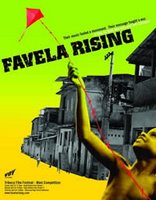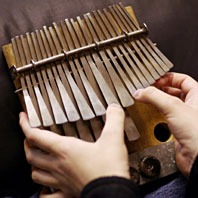Saturday, August 29, 2009
wires
Here's DB to explain what it's all about:
The Roundhouse was built in 1846 as a repair shop for locomotives on the nearby London and North Western Railway. I suppose then it's maybe appropriate that the musical sounds produced by Byrne's installation have something of an industrial quality, although this might be true of all buildings. Previous incarnations of "Playing the Building"--at the Färgfabriken in Stockholm and the Battery Maritime Building in New York--seem to have produced sounds with similar characteristics.
Byrne makes a point of his intention to democratise the playing process. This might be true where musical pitch is concerned, but the way people interact with the instrument perhaps raises some questions. Aren't experienced players more "at home" at the keyboard and maybe more likely to experiment with the different features? If it's difficult to predict the pitch of the keys you press, what about rhythm? Aren't musicians at an advantage in that respect?
At busy times, Roundhouse staff have had to "move on" players who have stayed at the keyboard for more than a couple of minutes so that everyone gets a turn. Do the long queues make people bored by the time they get a go? Are players self-conscious when it's their turn because of the long queue of other people waiting behind them?
Disappointingly, you can't really "see how it works" as Byrne claims. The different types of mechanisms may not be hidden from view as such but they are so far away that it's impossible to see how the sounds are being produced.
Interesting idea though...
Other stuff:
Saturday, September 27, 2008
strung along
Alim Qasimov and the Kronos Quartet @ the Barbican, 26th September
David Harrington, the leader of the Kronos Quartet, has received a fair amount of coverage in Songlines magazine in recent months by virtue of his--and the quartet's--espousal of non-western music. There's no doubt that in tackling the kind of pieces which they perform tonight--from Iraq, Iran and Bosnia--the Kronoses' reputation for taking string quartet music into unchartered territory is well deserved.
But what about their collaborations with non-western musicians? For the second half of tonight's concert, the Kronoses accompany a recital of Azerbaijani wandering minstrel songs by Alim Qasimov and his ensemble. I'm sure their string playing is technically impressive but I wonder what the quartet contribute to the music which wouldn't be there anyway.
Before we hear them sing and play together, we're shown video footage of rehearsals for tonight's concert. There seems little interaction between the two groups of musicians and, from the interview clips we see, Qasimov seems unsure that there is any common ground between them. Interesting that while the Azerbaijanis sing and play from memory (that's probably how they've learned the music), from beginning to end the four string players have their noses well and truly buried in their sheet music.
Links:
- Times Review of the concert
- youtube documentary about Alim Qasimov (part 1, part 2)
- More on Azerbaijani music
Tuesday, July 22, 2008
freeloading
Folk Day at the Proms, Royal Albert Hall, 20th July
I sometimes forget what great value the Proms are--you get a concert every night for two months at a fiver a go. I think it's just that these days so-called "classical" music is at the bottom of my pecking order of musical "genres" (I hate that word). Pop/rock, world, jazz and folk take precedence so classical doesn't get much of a look-in anymore.
In recent years the Proms have been casting their net a bit more widely genre-wise, and the (free) gig this afternoon is a case in point: a selection of songs firstly presented in their "folk" setting--courtesy of Bella Hardy and veteran Hungarian-Gypsy foursome Muzsikas--then as orchestral appropriations courtesy of Vaughan Williams, Percy Grainger, Bartok...
It all raises some interesting questions (humour me):
- should composers pass off as their own tunes which have been written and developed over a long period of time by a number of different singers?
- are their arrangements even based on the same tunes, bearing in mind the conventions of "classical" orchestral music with regard to form and harmonic and instrumental embellishment?
- do folk musicians see the virtue of songs being revived by classical composers, given that they present them in such a different way?
Oh I don't know...
P.S. There's a selection of clips on youtube from the evening "Proms Folk Day" concert featuring Bella Hardy (again), Martin Simpson and the fantastic Bellowhead.
Wednesday, March 19, 2008
frith street
Interesting stuff. This is my feeble attempt to summarise pretty randomly some of the ideas and themes which came to light:
- Conventional accounts of the history of pop music should be challenged: they're often based on newspaper stories which are likely to recount single events rather give an accurate overview. For example, accepted wisdom is that the punk era was the first to inspire large numbers of British youth to get involved in music-making. In fact, of far more significance in this respect were the late 1950s, when a revival in trad jazz and the advent of rock and roll (under the influence of Elvis, Bill Haley et al) and skiffle (Lonnie Donegan) combined to much greater effect.
- In the 1950s, musical criticism in the popular press was concerned only with classical music; pop was seen as unimportant, ephemeral, and part of the light entertainment industry. It was the advent of the rock/pop album which effected a change in this respect. Frank Sinatra's 1950s Capitol recordings ("In the Wee Small Hours of the Morning", "Come Fly With Me") were the first "themed" albums, but until the early sixties, most long-playing records were little more than a collection of two- or three-minute singles. Here, as in many areas, the Beatles were hugely influential: albums like Sgt Pepper were produced as entities in themselves, with a carefully sequenced tracklists and cleverly designed cover packaging. The pop album became a work of art in itself. Ironically, just as pop had done earlier, classical music in recent years, particularly in the popular media, has embraced a "star system" of its own (Nigel Kennedy, Katherine Jenkins, classical "boy bands" Il Divo and G4).
- The musician's role has changed significantly in the pop era. In the 1950s being a musician--whether in an orchestra or a dance band--would have meant taking lessons, spending long hours practising on one's chosen instrument, learning to read music and to play on sight, possibly taking exams. The pop musician's route to success is likely to have been much shorter and less arduous: perhaps learning his craft by listening to records and observing other players, though developing no smaller area of expertise. Further developments in more recent years--both in the recording studio and in the composition and performance of the music (scratching, sampling, DJing)--have blurred the lines between musician and engineer.
- Notions of authenticity and artistic integrity are often important concerns of followers of established pop and rock artists: the need to be true to their style and their fanbase and not pandering to commerciality ("selling out"). At the same time, everywhere in pop music there are examples of stylistic pastiche. Artists draw on the styles of previous eras but bring something of themselves to the music. For example, in Teenage Fanclub's version of "Hey Mr Tambourine Man" a Scottish indie guitar band acknowledges its debt to the guitar style and close harmony vocals of the Byrds; Primal Scream's "Movin' On Up" pays tribute to the Rolling Stones, "Brimful of Asha" by Cornershop combines elements of British and Pakistani pop music. By this token, even artists on TV talent shows like the "X-Factor" can be said to have some merit.
- Finally, an interesting insight into the work of the Mercury jury. The panel is presented with a shortlist of twelve albums, but in deciding on a winner of this annual award for the best in British music, the judges consider at some length the degree to which the albums can be said to represent Britishness and produce a "British sound", for example in terms of...
- content: music should be "about" Britain in some way, possibly drawing on some shared idea of the British past, as with the Kinks, Sgt Pepper, Blur, the Smiths and Madness. Recent winners the Arctic Monkeys and Dizzee Rascal are good examples of "something which Americans wouldn't get",
- form (given that musical styles are likely to have their origins in African/American music to greater or lesser extent),
- representativeness and
- sensibility (sense of their audience, context).
Further up Frith Street:
Interviews from...
Wednesday, November 28, 2007
more than the notes...
 Billy Bragg's recent book, "The Progressive Patriot", discusses the idea of English identity in the multicultural 21st century and the Imagined Village are an attempt to draw on several elements to arrive at a shared expression of this identity, notably the "traditional" folk background of Martin and Eliza Carthy, Bragg's own Clash sensibilities and the non-western origins of various "world music" musicians (Sheila Chandra, Johnny Kalsi of the Dhol Foundation, Sheema Mukherjee of Transglobal Underground). In recent press interviews and in the pre-concert talk tonight, Bragg and group leader Simon Emmerson (late of Afro-Celt Sound System) are at pains to deny that they are out to trample over long-established folk traditions with a more electro/beat-based style. The presence of the Carthys--two members of "folk royalty"--as well as young members of the Copper Family offer some reassurance in this regard. Plenty of ideas to take on board, but the music was good too. Highlight for me was Benjamin Zephaniah's video'd take on "Tam Lin".
Billy Bragg's recent book, "The Progressive Patriot", discusses the idea of English identity in the multicultural 21st century and the Imagined Village are an attempt to draw on several elements to arrive at a shared expression of this identity, notably the "traditional" folk background of Martin and Eliza Carthy, Bragg's own Clash sensibilities and the non-western origins of various "world music" musicians (Sheila Chandra, Johnny Kalsi of the Dhol Foundation, Sheema Mukherjee of Transglobal Underground). In recent press interviews and in the pre-concert talk tonight, Bragg and group leader Simon Emmerson (late of Afro-Celt Sound System) are at pains to deny that they are out to trample over long-established folk traditions with a more electro/beat-based style. The presence of the Carthys--two members of "folk royalty"--as well as young members of the Copper Family offer some reassurance in this regard. Plenty of ideas to take on board, but the music was good too. Highlight for me was Benjamin Zephaniah's video'd take on "Tam Lin". A couple of nights earlier, Edwyn Collins gave us an impressive run through a mix of Orange Juice classics and numbers from his solo career, impressive particularly since this was about much more than hearing the music. What an achievement for him to have got this far only a couple of years after two brain haemorrhages left him almost completely paralysed. It's difficult for those of us watching and listening to appreciate what it means to him to be back performing again. This Times Review of the gig says it quite eloquently.
A couple of nights earlier, Edwyn Collins gave us an impressive run through a mix of Orange Juice classics and numbers from his solo career, impressive particularly since this was about much more than hearing the music. What an achievement for him to have got this far only a couple of years after two brain haemorrhages left him almost completely paralysed. It's difficult for those of us watching and listening to appreciate what it means to him to be back performing again. This Times Review of the gig says it quite eloquently.I.V. Lynx:
Review of I.V.s in Liverpool earlier in the tour
Guardian review of "The Progressive Patriot"
Wikipedia on "Tam Lin"
Back in the day: Simon Emmerson when he had hair, and a different surname
E.C. Lynx:
allmusic.com waxes lyrical about the OJ's
Edwyn is back / "I was dead -- and I was resurrected"
"The Orange Juice and Postcard Records Website". Yay.
Back in the day: YouTube video vaults
Friday, March 17, 2006
sound and vision
- a Channel 5 programme about folk music in the North East of England featuring Kathryn Tickell, Northumbrian piper and fiddler, and showing some of her work as a teacher in Northumbrian schools. It's great that people like this are doing something to preserve this music and pass it on to future generations. Interesting that you can now do a degree in folk and traditional music at Newcastle University, apparently the first course of its kind in the UK.
- then I put the radio on. "The Organist Entertains" really is a remnant from a bygone age, with a selection of tunes played on huge theatre and cinema organs. Amazing to think there is still such a community of enthusiasts out there and credit to Radio 2 for continuing to put the show on, another example music of the past being preserved.

- then later in the week I saw "Favela Rising" at the cinema. Anderson Sa and his band, Afro-Reggae, have done fantastic work in recent years in the favelas/shanty towns of Rio by getting youngsters involved in music- making and offering them an alternative to a life of crime mixed up with the local drugs trade. Now signed to a record label and touring in Brazil and overseas (recently opening the Barbican's current "Tropicalia" season), the band have ploughed all royalties back into the favelas. It'll be interesting to see if their international success cuts them off from their roots at all as time goes on.
More about the rise of Afro-Reggae.
Wednesday, January 18, 2006
another day on earth
 The Centre for Contemporary Music Cultures at Goldsmiths had its first guest speaker last night: Brian Peter St. John Le Baptiste de la Salle Eno, composer, video artist, record producer, sound engineer, prolific musical collaborator, recording artist in his own right, etc etc. Quite a coup to get him to come along and talk to us and obviously much for him to talk to us about. Predictably, he didn't dish much dirt about Bowie's cocaine-fuelled excesses or those marathon sex sessions with Roxy Music groupies. The most gossip we got was his story about going back to his flat in Maida Vale with Talking Heads in the late seventies and playing them records by Fela Kuti, who he thought was the future of pop music. Talking Heads agreed, apparently.
The Centre for Contemporary Music Cultures at Goldsmiths had its first guest speaker last night: Brian Peter St. John Le Baptiste de la Salle Eno, composer, video artist, record producer, sound engineer, prolific musical collaborator, recording artist in his own right, etc etc. Quite a coup to get him to come along and talk to us and obviously much for him to talk to us about. Predictably, he didn't dish much dirt about Bowie's cocaine-fuelled excesses or those marathon sex sessions with Roxy Music groupies. The most gossip we got was his story about going back to his flat in Maida Vale with Talking Heads in the late seventies and playing them records by Fela Kuti, who he thought was the future of pop music. Talking Heads agreed, apparently.
Not surprisingly, there's already lots of stuff on the internet about him and his varied career but here's a list of some of the topics he touched on in his hour and a half with us, along with links to some sites which go into a bit more detail:
- Generative music (which he claimed to have invented although a lot of the contemporary music crowd at Goldsmiths were of the view that other composers did this before, or better than, Eno);
- "Ambient" music ("Music for Airports" et al);
- Songwriting (This quote seems to sum up at least some of what he was saying about this: "... if you think of a piece of music like a landscape, you’re free to think what you want about it; it’s about you, the listener. But as soon a figure appears in that landscape [the singer, for example], that figure becomes the center of attention and directs your thoughts. No longer is the music about the listener, but about the composer [or the singer, presumably].")
- The Portsmouth Sinfonia in which he "played" the clarinet;
- The "Oblique Strategies" cards
Some sites with more info about Eno:
- the BBC music and wikipedia sites: good starting points;
- the "Independent on Sunday"'s 50th birthday tribute: interesting, detailed but readable;
- the "official" Enoweb site - extensive (often huge) lists of his recordings, interviews and books about him and his work.
Friday, January 13, 2006
under my thumb
 The mbira is a kind of "thumb piano" (as they're popularly known in European and North America) which I've been learning to play for about six months. They're played in various forms in many parts of Africa but the particular instrument I have been learning is played by the Shona people who live in the northern part of Zimbabwe in the southern half of the continent. Mbira music is used as an important part of the bira religious ceremony in which the Shona consult the spirits of their ancestors and ask for their guidance in everyday matters. The trance-inducing properties of the music help mediums to become possessed by the spirits.
The mbira is a kind of "thumb piano" (as they're popularly known in European and North America) which I've been learning to play for about six months. They're played in various forms in many parts of Africa but the particular instrument I have been learning is played by the Shona people who live in the northern part of Zimbabwe in the southern half of the continent. Mbira music is used as an important part of the bira religious ceremony in which the Shona consult the spirits of their ancestors and ask for their guidance in everyday matters. The trance-inducing properties of the music help mediums to become possessed by the spirits.Although playing the mbira is not technically too difficult (and I haven't become possessed by any hostile spirits yet either!), the sounds produced are actually quite complex, particularly when several instruments play together. So it made a good case study to write about and I found out a lot of things I hadn't picked up while learning to play the instrument.
- More info about the mbira and Shona music (mbira.org website)
- More info about Zimbabwe (BBC website)
- Some recordings (Catalogue of the British Library Sound Archive)